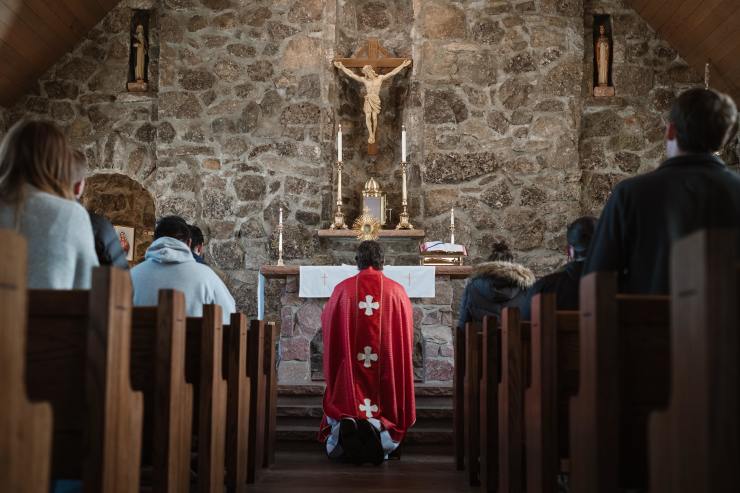
In order to prevent the Vatican's designated administrator from entering the Archbishop's House, lay people in an archdiocese of the Eastern-rite Syro-Malabar Church began a 24-hour vigil on October 16.
Syro-Malabar Church lay leaders in Kerala claim that Archbishop Andrews Thazhath, the apostolic administrator, arbitrarily removed the permission that had previously enabled priests to say Mass facing the congregation.
Priests and members of the general public in protest have been calling for Archbishop Thazhath's resignation and accusing him of deceiving the Vatican and attempting to impose the bishops' synod's approved liturgical pattern, which requires priests to face the altar instead of the congregation during the Eucharistic prayer until Communion.
On July 30, the Vatican designated the archbishop of Trichur as the apostolic administrator of Ernakulam-Angamaly with the responsibility of resolving the liturgical conflict brought on by the intense resistance to the synod's decision to have consistency in the celebration of the Eucharist.
Archbishop Thazhath ordered all priests to say the synod-approved Mass with immediate effect and cancelled their dispensation on September 30.
The majority of priests openly rejected the directive and kept saying Mass with the congregation. A circular published by Archbishop Thazhath on October 9 announcing the revocation of the dispensation and his command to the priests was also ignored by the priests.
The apostolic administrator's orders were disobeyed by more than 450 institutions, including 328 parishes and sub-parishes and religious houses, according to Riju Kanjookaran, the spokesperson of Archdiocesan Movement for Transparency (AMT).
Archbishop Thazhath justified his choice in a video message, stating he was simply carrying out the Vatican's orders.
The bishop, who is presently at the Vatican, said that he had spoken with Pope Francis, who had urged the clergy and laypeople to abide by the synod's decision.
The bishop further released a 35-second video footage of himself interacting with the pope at the Vatican's general audience on Wednesday.
The bishop also asserted that he had informed the pope of the population's request, but the pope persisted in "asking them to obey" the synod.
In his eight-minute address, Archbishop Thazhath claimed to have had in-depth conversations with Vatican authorities as well. He also accused his predecessor, Metropolitan Vicar Archbishop Antony Kariyil, of deceiving the faithful by allowing a dispensation from celebrating the synod mass.
After resisting the synod's demand to reverse the dispensation, Archbishop Kariyil was compelled to resign.
"What Archbishop Thazhat said in his video message from the Vatican is full of falsehoods," AMT organiser Shaiju Antony told UCA News.
He said that after staying for more than ten days, Archbishop Thazhath was denied a private meeting with the pope by their contacts in the Vatican.
There wasn't much time to discuss such a critical matter in only a few seconds when he saw the pope during his public audience, Antony said.
The AMT office holders believed that when the pontiff let Archbishop Kariyil grant their archdiocese a dispensation in November of last year, the situation had been resolved.
Antony said that the Syro-Malabar synod was responsible for undermining the pope's authority.
The Syro-Malabar Church's liturgical controversy began about fifty years ago when the Church undertook a reform of its liturgy. When the synod resolved to put into effect its 1999 resolution to introduce consistency in Mass throughout all dioceses in order to foster greater unity among its people, the simmering debate was reignited in August 2021.
Except for the Ernakulam-Angamaly Archdiocese, all 35 of the Church's dioceses have started using the synodally approved liturgy as of November.




